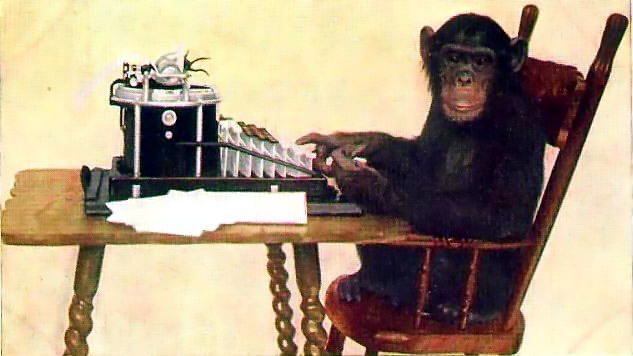Six Monkeys, One Month

Grab enough monkeys, enough time, and enough typewriters — an infinite amount of each, which the theorem importantly notes — and you’ll almost certainly end up with the complete works of William Shakespeare. That’s a mathematical theorem, not a literary one, one which helps explain the concept of infinity. But the saying has, at times, demonstrated just how difficult it is to understand the concept of infinity, as the number of monkeys and typewriters is often curtailed to merely a thousand of each. (The typewriter-using monkeys are still given “enough time” to write, of course, unless they’re working for Montgomery Burns.) As evidence that the saying is about math and not literature, just look to its origins. It dates back to 1913, when a French mathematician named Emile Borel wrote an article titled Mécanique Statistique et Irréversibilité (Statistical Mechanics and Irreversibility), and over time, it’s entered the wider lexicon. It’s obviously impossible to test — there simply aren’t an infinite amount of monkeys or typewriters.
But that didn’t stop others from trying.
An experiment — more accurately, the art project — took place at Paignton Zoo in Devon, England, in 2003. The project was funded by Arts Council England and carried out by a group of art students from the University of Plymouth, so it’s by no means scientifically valid, which is good because they didn’t have all that many monkeys or typewriters. The group placed a computer — just one — in the macaque enclosure, which was home to six primates of various age. The computer (so technically, that’s zero typewriters, but we’ll give them a pass) was hooked up to monitoring equipment so that observers could see what the monkeys were doing with their newfound tech. The team gave the half-dozen macaques a month to wax poetic about the death of Julius Caesar or the tribulations of a young couple born to rival families.
The monkeys did no such thing. As the BBC reported, “the Sulawesi crested macaques had only succeeded in partially destroying the machine, using it as a lavatory, and mostly typing the letter ‘s.'” (Perhaps they were starting with the Bard’s last name.) In total, they produced five pages of text — gibberish, of course, given the high frequency of the letter “s” — produced in part when “the lead male began bashing the keyboard with a stone” per Wikipedia. No Shakespeare came to pass. The monkeys couldn’t even produce a dime-store novella.
Wired has a two-image slideshow (to use the term loosely — there are only two pictures, after all) of the monkeys at the computer, viewable here. Thankfully, the two images do not seem to depict the “using [the computer] as a lavatory” part of the “experiment.”
Bonus Fact: Macaque monkeys may not be talented novelists, but they make for acceptable waiters. Just ask Kaoru Otsuka, the owner of the Kayabukiya Tavern, a sake house not too far from Toyko. Otsuka employs his two pet monkeys, Yatchan and Fukuchan, as servers of warm towels and various drink, as seen in this BBC report. (Here’s a clip from YouTube with more.) According to the tavern’s Wikipedia entry, the two animals are only allowed to work two hours a day in order to comply with animal rights regulations.
From the Archives: Imperialist Monkeys: They aren’t all fun and games (or books and food service).
Related: The Complete Works of William Shakespeare. Probably not written by a collection of typewriter-using monkeys, but one never can be too sure about these types of things.
